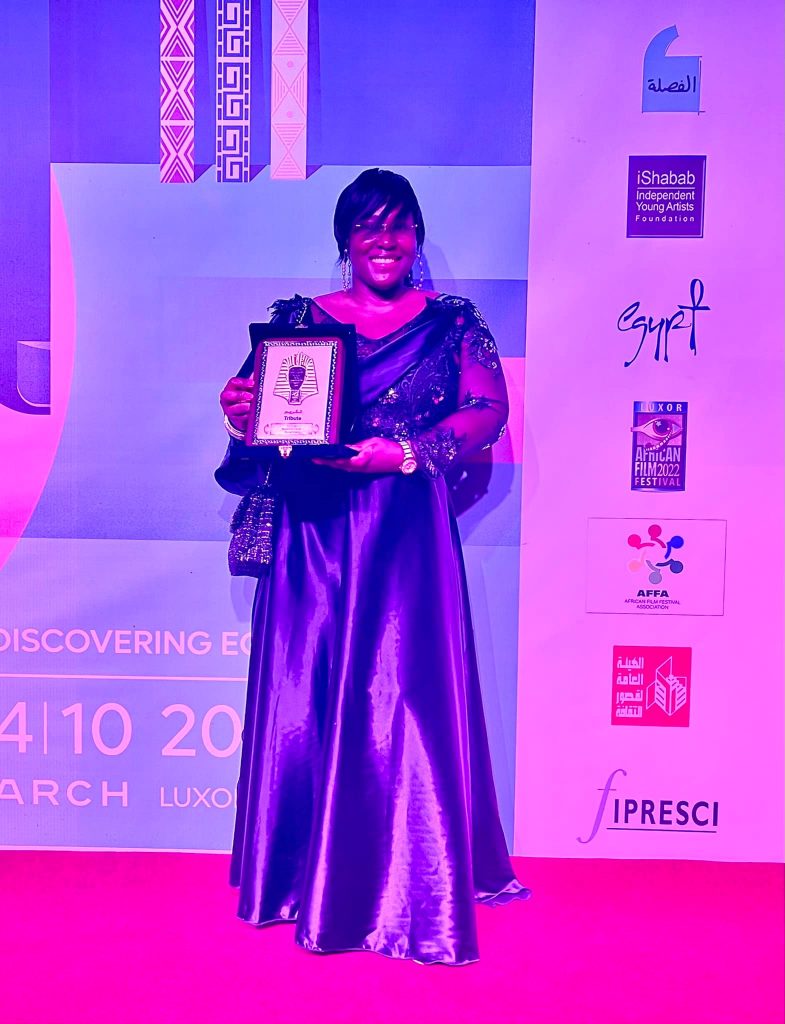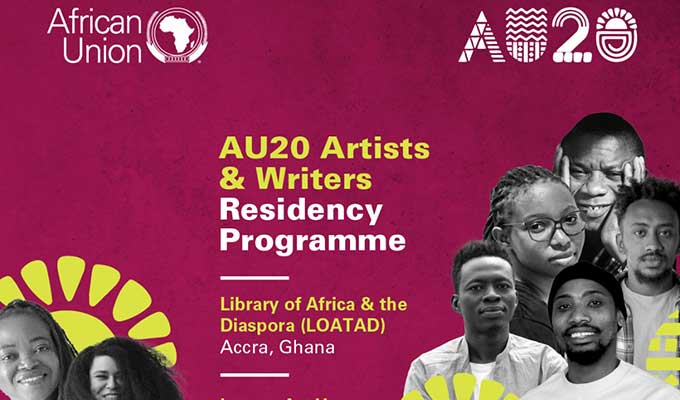CINEMA
[CINÉ-ART] – Apolline Traoré awarded at the Luxor African Film Festival in Egypt

The curtain fell on the 11th edition of the Luxor African Film Festival on March 10, 2022 in Egypt. We were far from the red carpet of Cannes with its limousine ballets with tinted windows, its costumed dandies, with a nonchalant look, and its midgets botoxed in pumps. 35 countries and 45 films in competition. I’ll admit it: we were far from the quota of previous editions. But, it was well worth the detour.
Under the beleaguered gaze of Hatshapsout, the only pharaoh in the history of Egypt – they must have been bloody machistas, our Egyptian ancestors! – dancers of another age move their prominent rumps. Guests, tap-dancing, smile wide. Three shots hit at a certain pace. Action. It’s spinning. A brilliantly lit room opens its doors; it is the Winter Palace with its pretentious scenery. Egyptians like to see big. Films. Names. Ovations. Then, a name. Hearty applause. A woman, still a woman! , sublime in death takes the podium. Behind her, a projection (of her) turns. But, it is she who pops the screen by her presence. Her name is Apolline Traoré.

Who’s that one again?
Let’s keep it simple and short. We’ll talk about Apolline Traoré, a Burkinabe filmmaker. We won’t talk about her age. It seems that women are not told how old they are, especially when they are in their thirties. Feminists might find a pig to swing. Personally, I don’t know her. We only have two friends in common on Facebook. Two virtual friends I’ve never “liked” and I don’t know Adam or Mariam. But, according to what I read on her wikipedia page, she grew up in Burkina Faso before finding herself, like most children of senior civil servants, in a prestigious Western school. As far as she is concerned, her father did not go into lace: he sent her to continue her studies at Emerson College, an excellent school of art and communication in Boston.

Everything really begins for her from 2000. She makes a series of short films, in order to make her hand before the big jump in the most serious, in the heavy, in the feature films. Serious productions with huge budgets that require breath and breath, and also a certain form of professionalism that is lacking in African cinema. In 2003, she produced and directed a superb short film called Konandi, la chanceuse, in bambara. She expects a lot from this film, which will be selected for the 2004 Toronto International Film Festival. A brief flash of lightning quickly smothered by the halo of silence. She misses the consecration. Expectations are disappointed. It’s bad luck. But as a struggling woman, she did not give up. That same year, she produced and directed her first feature film, “Under the Moonlight”. Camouflaged. The film does not meet the expected success. Distraught, she returned home to learn the workings of the African trade from Idrissa Ouedraogo, the director of the successful TV film Kadi Jolie. Winning choice. Upon his return home, his career explodes.
These films are successful, even though we are far from the Hollywood box offices. This Fespaco subscriber wins prizes and awards.
The latest is the distinction that the Luxor African Film Festival has just awarded him for his entire career.

CINEMA
MOROCCO – Morocco is in the spotlight at the 76th edition of the Cannes Film Festival by Asmae el moudir

Maryam Touzany, as a member of the official jury of the 76th Cannes Film Festival, will play a key role in the evaluation and selection of films in competition. As a member of the jury, she will bring her expertise, perspective and informed judgment to determine the winners in different categories. Maryam Touzany’s participation as a member of the jury highlights the importance of diversity and representation in the selection process of the Cannes Film Festival.
The 4 films supported by the «Atlas Workshops» selected:
1.Asmaa EL MOUDIR – The mother of all lies:
This film, directed by Asmaa El Moudir, is presented in the official selection of the 76th Cannes Film Festival. “The mother of all lies” explores the themes of truth, manipulation and the consequences that follow. The film immerses viewers in a compelling story where a mother’s lies have a profound impact on the lives of her family and those around her. Through a powerful narrative, the film addresses universal questions of integrity, trust and responsibility.
2. Faouzi BENSAIDI – Deserts:
“Deserts”, directed by Faouzi Bensaidi, is another Moroccan film selected in the official category of the Cannes Film Festival. This feature film explores the themes of isolation, the quest for identity and the search for meaning in a complex modern world. The film follows the path of a protagonist confronted with physical and emotional deserts, struggling to find his place in a constantly changing environment. With beautiful landscapes and a profound reflection on human existence, “Deserts” promises an intense and introspective cinematic experience.
Kamal LAZRAQ – The Packs:
“Les Meutes”, directed by Kamal Lazraq, is a Moroccan film selected in the official category of the Cannes Film Festival. This film addresses contemporary social and political themes by exploring group dynamics and collective movements. Through a powerful and provocative narrative, the director sheds light on the tensions, aspirations and struggles emerging within the packs, symbolizing the complex social dynamics of our time. The Packs” offers a profound reflection on human nature, individual aspirations and the power of collective movements.
4 . Zineb WAQRIM – Ayyur:
“Ayyur”, directed by Zineb Waqrim, is another Moroccan film presented in the official selection of the Cannes Film Festival. This feature film explores the story of a young woman facing patriarchal traditions and social constraints in a rural context. Through its journey of resilience and empowerment, the film addresses themes such as individual freedom, gender equality and the quest for identity. Ayyur” offers a unique perspective on the challenges faced by Moroccan women and the search for their own voice in a traditional society.

CINEMA
SENEGAL – Vues d’Afrique International Film Festival: Mame Woury Thioub wins short documentary award

Senegalese director Mame Woury Thioub wins the short documentary award at the 39th Vues d’Afrique International Film Festival in Montreal from April 21 to 30, 2023.
The Vues d’Afrique International Film Festival is the largest festival of its kind outside the continent, screening more than 100 films each year about Africa, the Creole countries and their diasporas. A showcase for African and Creole cinema, this must-see event is a forum for exchange between international film professionals.
With a new perspective on Africa, Creole countries and diasporas, through the dissemination of cultural productions, Vues d’Afrique promotes cultural diversity and the rapprochement between people of all origins and African and Creole countries.
Mame Woury Thioubou is a journalist by training. Between 2004 and 2007, she was the Matam correspondent for Le Quotidien. In 2009, she joined the Master of Documentary Direction of Creation of the University Gaston Berger de Saint Louis (UGB). The school film she directed in 2009, Face à face, won the Ebène award for Best Documentary at the Neighbourhood Film Festival.
In 2011, she directed Une journée avec Ngoné as part of a series in collaboration with Arte. Mame Woury Thioubou, who trained at Africadoc des Fondamentaux de la Production in 2016, joined the Impluvium Productions structure.
The same year, she directed her first medium-length film Agora Braille, which deals with the schooling of blind children in Senegal through the struggle of an emblematic woman, Aïssata Pouye. In 2018, she completed her first feature film, Fifiré en Pays Cuballo in the Senegal River Valley.
CINEMA
AFRICA – Two African films honoured at the Cannes Film Festival

On April 13, the 76th Cannes Film Festival announced the films chosen to participate in its official competition. Two African productions have been selected to try to win the Palme d’Or of this edition which will be held from 16 to 23 May.
Two African films were selected to try to win the Palme d’Or at the Cannes Film Festival. The information was made public at the official announcement of the
19 films will be in the running to win the 76th gold prize at the Cannes Film Festival from 16 to 23 May. Africa is not left out with two films selected. Among them are «Banel et Adama» by Franco-Senegalese filmmaker Ramata-Toulaye Sy (photo), and «Olfa’s daughters» by Tunisian Kaouther Ben Hania. Shot in the Pulaar language, a variety of Peul mainly spoken in Senegal, with a team mostly Senegalese, Banel and Adama seem to attach great importance to the identity it conveys.
The daughters of Olfa a documentary that follows the tumult of the life of a woman whose two teenage daughters are radicalizing and joining the terrorist organization Daesh in Libya.
“The focus has been more on Asia in the last 20 years, with other countries like Japan, and now on Africa, because that’s where a number of young filmmakers from North Africa, East Africa, are coming from. from English-speaking Africa or sub-Saharan Africa, as Senegal is in competition,” explains Thierry Fremaux, director of the Cannes Film Festival.
The two filmmakers are not the only ones to represent the African continent. Sudanese Mohamed Kordofani, Congolese Baloji Tshiani, as well as Moroccans Kamal Lazraq and Asmae El Moudir were also selected in the “Un certain regard” section of the official selection dedicated to young talent and innovation.
-

 EAST AFRICA1 year .
EAST AFRICA1 year .TANZANIA – President meets with Chairman of the Board and CEO of the Merck Foundation
-

 CHAUD TOO CHAUD3 years .
CHAUD TOO CHAUD3 years .POLITICS – [INTERVIEW EXCLUSIVE] – MADAGASCAR – Fanirisoa Ernaivo, a politician and activist committed to the rule of law and respect for democracy
-

 BUSINESS8 months .
BUSINESS8 months .GUINEA – Authorities demand repatriation of mining revenues
-

 CULTURE2 years .
CULTURE2 years .AFRICA – African writers and artists celebrate the 20th anniversary of the African Union
-

 POLITICS5 months .
POLITICS5 months .SENEGAL – Presidential election 2024: Registration of 79 candidates declared
-

 IMMIGRATION10 months .
IMMIGRATION10 months .AFRICA – Migrant smuggling brings 59 billion CFA francs to smugglers per year
-

 CULTURE3 years .
CULTURE3 years .SENEGAL – “Sadik Lady” by Viviane Chidid
-

 POLITICS3 years .
POLITICS3 years .SOUTH AFRICA – Former President Jacob Zuma in prison



